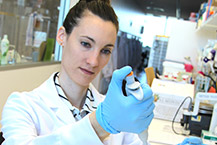
Rhonda Taylor at the Harry Perkins Institute of Medical Research
A quest to discover the mechanism that causes a particular protein-activating gene to switch off at birth has helped a Perth researcher collect one of two research prizes awarded annually by the Department of Health.
Rhonda Taylor, a researcher at the Harry Perkins Institute of Medical Research, believes unlocking this genetic mystery could hold the key to a cure for a rare but debilitating muscle-wasting disease, nemaline myopathy, that usually shows up at – or soon after – birth.
The disease causes muscle weakness, reduced movement and difficultly feeding and breathing. There is currently no therapy or cure for the disease and many born with the condition die within the first year of life.
“Babies born with this disease have reduced muscle movement, don’t smile and have difficulty breathing and feeding,” Dr Taylor says.
The disease is caused by a fault in the gene responsible for producing skeletal muscle actin, a protein found in skeletal muscles – the voluntary muscles in our limbs and trunk.
This fault is not detected prior to birth because heart actin – a protein of the heart that is almost identical in composition and function to skeletal muscle actin – is produced by another gene and this compensates for the defective skeletal muscle actin.
At birth however, the gene for heart actin switches off – exposing the malfunctioning skeletal muscle actin.
“If we can keep the heart actin gene switched on in people who have this condition, we may be able to prevent the otherwise inevitable muscle wastage,” Dr Taylor says.
Some of her research colleagues have already discovered that mice with skeletal muscle actin mutations are rescued when given heart actin.
“These mice would normally die within nine days,” she says.
“But when they are given heart actin in their skeletal muscles, they survive to old age.”